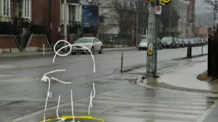Ontology recapiltulates phylogeny
 I may be reaching the "get off my lawn!" stage of life, except the things I'm yelling at are not harmless children but new technologies, many of which, as Charlie Stross writes, leak human stupidity into our environment.
I may be reaching the "get off my lawn!" stage of life, except the things I'm yelling at are not harmless children but new technologies, many of which, as Charlie Stross writes, leak human stupidity into our environment.
Case in point: a conference this week chose for its platform an extraordinarily frustrating graphic "virtual congress center" that was barely more functional than Second Life (b. 2003). The big board displaying the agenda was not interactive; road signs and menu items pointed to venues by name, but didn't show what was going on in them. Yes, there was a reception desk staffed with helpful avatars. I do not want to ask for help, I want simplicity. The conference website advised: "This platform requires the installation of a dedicated software in your computer and a basic training." Training? To watch people speak on my computer screen? Why can't I just "click here to attend this session" and see the real, engaged faces of speakers, instead of motionless cartoon avatars?
This is not a new-technology issue but a usability issue that hasn't changed since Donald Norman's 1988 The Design of Everyday Things sought to do away with user manuals.
I tell myself that this isn't just another clash between generational habits.
Even so, if current technology trends continue I will be increasingly left behind, not just because I don't *want* to join in but because, through incalculable privilege, much of the time I don't *need* to. My house has no smart speakers, I see no reason to turn on open banking, and much of the time I can leave my mobile phone in a coat pocket, ignored.
But Out There in the rest of the world, where I have less choice, I read that Amazon is turning on Sidewalk, a proprietary mesh network that uses Bluetooth and 900MHz radio connections to join together Echo speakers, Ring cameras, and any other compatible device the company decides to produce. The company is turning this thing on by default (free software update!), though if you're lucky enough to read the right press articles you can turn it off. When individuals roam the streets piggybacking on open wifi connections, they're dubbed "hackers". But a company - just ask forgiveness, not permission, yes?
The idea appears to be that the mesh network will improve the overall reliability of each device when its wifi connection is iffy. How it changes the range and detail of the data each device collects is unclear. Connecting these devices into a network is a step change in physical tracking; CNet suggests that a Tile tag attached to a dog, while offering the benefit of an alert if the dog gets loose, could also provide Amazon with detailed tracking of all your dog walks. Amazon says the data is protected with three layers of encryption, but protection from outsiders is not the same as protection from Amazon itself. Even the minimal data Amazon says in its white paper (PDF) it receives - the device serial number and application server ID - reveal the type of device and its location.
We have always talked about smart cities as if they were centrally planned, intended to offer greater efficiency, smoother daily life, and a better environment, and built with some degree of citizen acceptance. But the patient public deliberation that image requires does not fit the "move fast and break things" ethos that continues to poison organizational attitudes. Google failed to gain acceptance for its Toronto plan; Amazon is just doing it. In London in 2019, neither private operators nor police bothered to inform or consult anyone when they decided to trial automated facial recognition.
In the white paper, Amazon suggests benefits such as finding lost pets, diagnostics for power tools, and supporting lighting where wifi is weak. Nice use cases, but note that the benefits accrue to the devices' owner while the costs belong to neighbors who may not have actively consented, but simply not known they had to change the default settings in order to opt out. By design, neither device owners nor server owners can see what they're connected to. I await the news of the first researcher to successfully connect an unauthorized device.
Those external costs are minimal now, but what happens when Amazon is inevitably joined by dozens more similar networks, like the collisions that famously plague the more than 50 companies that dig up London streets? It's disturbingly possible to look ahead and see our public spaces overridden by competing organizations operating primarily in their own interests. In my mind, Amazon's move opens up the image of private companies and government agencies all actively tracking us through the physical world the way they do on the web and fighting over the resulting "insights". Physical tracking is a sizable gap in GDPR.
Again, these are not new-technology issues, but age-old ones of democracy, personal autonomy, and the control of public and private spaces. As Nicholas Couldry and Ulises A. Mejias wrote in their 2020 book The Costs of Connection, this is colonialism in operation. "What if new ways of appropriating human life, and the freedoms on which it depends, are emerging?" they asked. Even if Amazon's design is perfect, Sidewalk is not a comforting sign.
Illustrations: A mock-up from Google's Sidewalk Labs plan for Toronto.
Wendy M. Grossman is the 2013 winner of the Enigma Award. Her Web site has an extensive archive of her books, articles, and music, and an archive of earlier columns in this series. Stories about the border wars between cyberspace and real life are posted occasionally during the week at the net.wars Pinboard - or follow on Twitter.